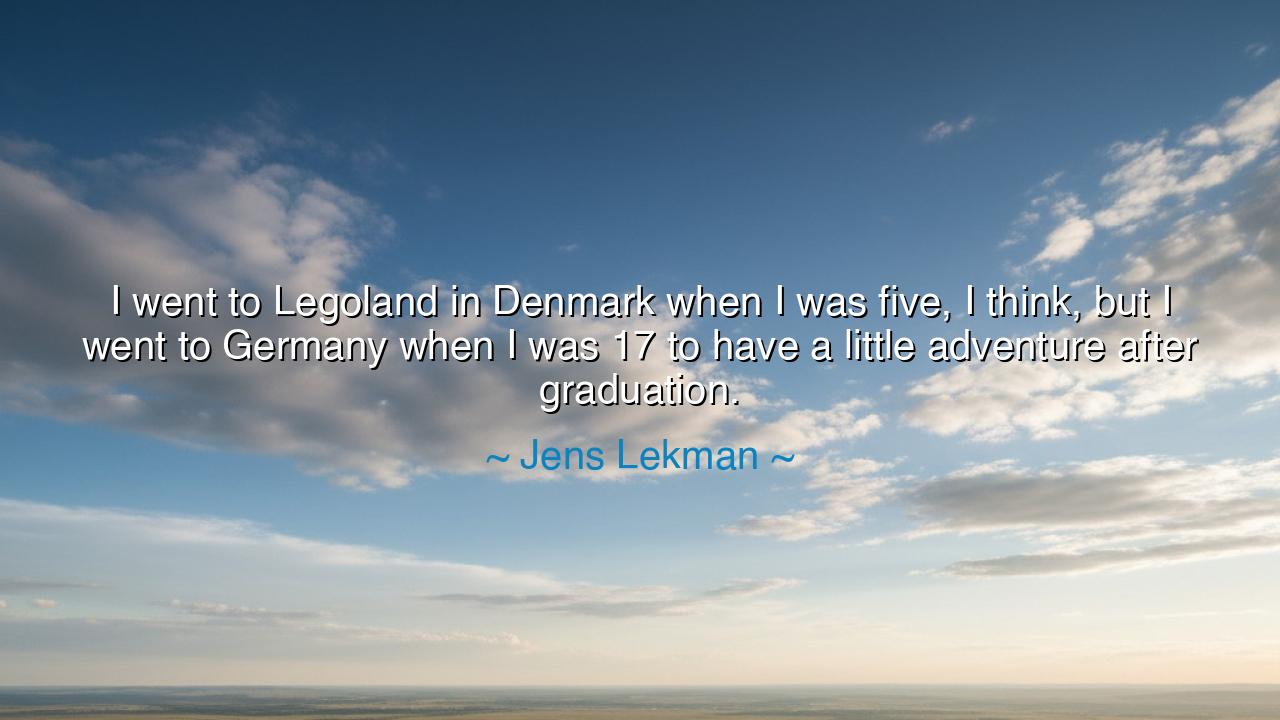
I went to Legoland in Denmark when I was five, I think, but I
I went to Legoland in Denmark when I was five, I think, but I went to Germany when I was 17 to have a little adventure after graduation.






The Swedish musician Jens Lekman, known for weaving poetry into melody and nostalgia into song, once said: “I went to Legoland in Denmark when I was five, I think, but I went to Germany when I was 17 to have a little adventure after graduation.” Though his words seem light and unassuming, they hold within them a deeper current — the story of innocence transforming into experience, of a child’s first wonder growing into a young man’s search for freedom. His reflection is not simply a recollection of travel; it is a meditation on how life unfolds in stages — from the small playgrounds of youth to the wide, uncertain roads of independence.
The first image, “Legoland in Denmark,” speaks to the simplicity of early wonder. At five years old, the world is a vast and magical place, built not of stone but of imagination. Legoland — a land literally made of toys — is a fitting symbol of childhood itself: colorful, creative, safe. It represents the first awakening of the human soul to the beauty of building, exploring, and dreaming. For a child, every structure is a castle, every journey a quest. Lekman’s mention of it is not mere nostalgia, but a remembrance of the first stage of human discovery — the age of play, when curiosity is pure and unburdened by consequence.
But then comes the turning point: “I went to Germany when I was 17 to have a little adventure after graduation.” Here, the tone shifts from innocence to initiation. The boy who once played with bricks now steps into the world to build himself. Germany, in this context, becomes a symbol of adulthood, the place where imagination meets reality, where one’s dreams must face the test of distance and self-reliance. The phrase “a little adventure” carries both humility and courage — for every great journey begins as something small. To leave home, to cross borders, to wander with open eyes and a beating heart — this is the modern rite of passage, the quiet revolution of youth claiming its first taste of freedom.
Throughout history, this moment — the journey after youth — has been seen as sacred. The ancient Greeks sent their sons into the world for paideia, the education of the soul through experience. The Japanese still observe seijin no hi, the coming-of-age celebration where the young step into society with pride and responsibility. And in the old European tradition, artists and scholars embarked on what was called The Grand Tour, traveling across the continent to broaden their minds and deepen their character. Jens Lekman’s “adventure after graduation” is a continuation of this lineage — a recognition that travel is not escape, but awakening.
There is also a quiet wisdom in how he recalls both memories in the same breath — childhood and youth, play and adventure, the small and the vast. It reminds us that life’s stages are not separate, but continuous. The wonder of the child feeds the courage of the adolescent; the play of the past becomes the curiosity that fuels exploration. By remembering both journeys, Lekman honors the whole arc of becoming — from the boy who dreamed among toy bricks to the young man who dared to step beyond the walls of familiarity. His reflection teaches that growth is not about discarding who we were, but about expanding upon it — carrying the child’s wonder into the adult’s adventure.
The lesson, then, is simple but profound: never lose the spirit of exploration. Whether you are five or seventeen, whether your journey takes you across oceans or only across the boundaries of your own fear, remember that every step away from comfort is a step toward self-discovery. Seek out adventures that awaken your heart, not just your ambition. Let curiosity lead you as it did when you were young, and let courage guide you as it does when you grow. For life, in its truest form, is a lifelong graduation — each journey preparing you for the next.
And so, let the words of Jens Lekman be remembered not as a passing memory, but as a timeless whisper to all who stand on the edge of their own beginnings: “I went to Germany when I was 17 to have a little adventure after graduation.” Go forth and have your adventure — not for glory, but for understanding; not to escape your home, but to rediscover it anew upon your return. For every journey, whether to Legoland or beyond, is a piece of the greater pilgrimage — the journey of becoming oneself.






AAdministratorAdministrator
Welcome, honored guests. Please leave a comment, we will respond soon